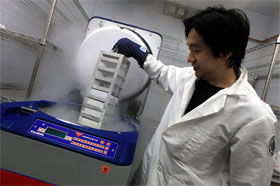Feature Story
Health Center Today, November 10, 2010
Dr. Laurencin and Other Medical Education Leaders Urge Congress to Support Stem Cell Legislation
By Carolyn Pennington

Researcher Xiaofang Wang works with frozen stem cells in the Health Center's Stem Cell Core lab.
Photo courtesy of Getty Images
In a recent letter to congressional leadership, Dr. Cato Laurencin, medical school dean and vice president for health affairs, joined more than 100 representatives of the nation’s medical schools and teaching hospitals who called on Congress to pass the “Stem Cell Research Advancement Act.” U.S. medical schools deans, teaching hospital CEOs, and academic society presidents urged action on the legislation, which would continue federal support for human embryonic stem cell research before the end of the current congressional session in November.
The letter stated, “The discovery of human embryonic stem cells is a significant research advance and federal support to U.S. researchers is essential both to translate this discovery into novel therapies for a range of serious and intractable diseases, and to ensure that this research is conducted under a rigorous and credible ethical regime.”
The letter went on to say, “This legislation, which has received strong bipartisan support in previous Congresses, recognizes the need to authorize and continue federal support of research on human embryonic stem cells so that the tremendous scientific and medical benefits of their use may one day become available to the millions of patients who so desperately need them.”
The effort to pass such a bill has recently taken on some urgency. In August, a federal district court judge found that the Obama administration’s stem cell policy violates a law barring federal financing for “research in which a human embryo or embryos are destroyed, discarded or knowingly subjected to risk of injury or death,” and issued an injunction blocking federal money for the research.
Since then a federal appeals court has allowed the government financing to continue while legal arguments wind their way through the courts. But some researchers have said they are now hesitant to submit grants involving human embryonic stem cells, fearing their research will not be funded.
Rep. Christopher Murphy (D - 5th) recently told UConn stem cell scientists that the best opportunity to pass the “Stem Cell Research Advancement Act” will be in November before the new, more conservative Congress, convenes in January.


